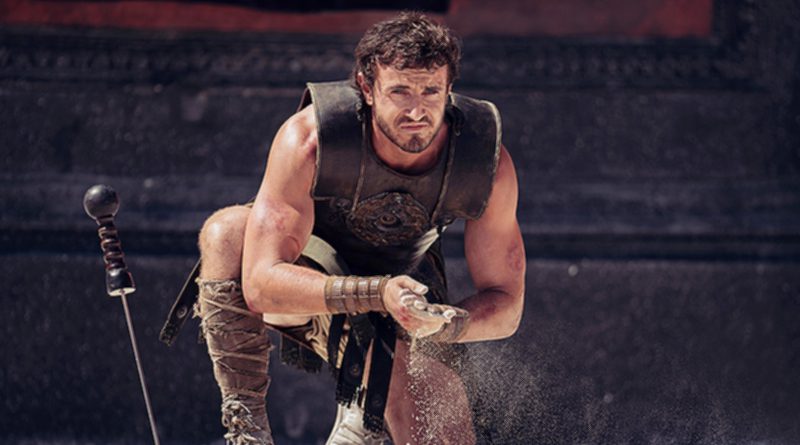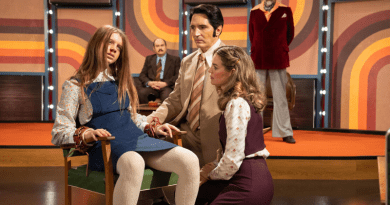Gladiator II (2024) Review: Denzel Washington’s Scene-Stealing Performance Elevates This Entertainingly Operatic Sequel
How do you make a Gladiator sequel where the main protagonist Maximus played by Russell Crowe already echoed in eternity at the end of the first movie? He had his revenge against Joaquin Phoenix’s Commodus, the new emperor who murdered his own father and ordered his soldiers to kill Maximus’ family in cold blood. Besides, Crowe’s Maximus and his quest for vengeance gave the 2000 Oscar-winning original an emotional weight and an attempt for a sequel feels like a sign of desperation.
And yet, it was Ridley Scott who chose to return to Rome, specifically, the Colosseum where the gladiators fight for their lives and glory. So, in Gladiator II, twenty-four years after the events of the first movie, the sequel now focuses on a new protagonist in the form of Hanno (Paul Mescal). Hanno is actually Lucius, the name that we learn later in the movie but it’s hardly a surprise anyway. Lucius, of course, previously appeared as a young boy in the first movie where Spencer Treat Clark played the role. He idolised the gladiators, particularly Maximus and he is also the son of Lucilla (Connie Nielsen) and the nephew of Commodus.
Scott took the gamble of casting Paul Mescal in the lead, who is primarily known for his acclaimed indie movies like Aftersun and All of Us Strangers instead of going with either of these familiar faces including Austin Butler, Richard Madden or Miles Teller. I admit Mescal was an unlikely choice to play the lead, especially when he’s stacked against acting heavyweights including Pedro Pascal and Denzel Washington.
In the sequel which takes place sixteen years after the death of Maximus, Rome is now under the tyrannical reign of twin-brother emperors, Geta (Joseph Quinn) and Caracalla (Fred Hechinger). The tradition of gladiatorial combats in the Colosseum has become deadlier than ever while the Roman Empire continues to expand its ruling around the world including the North African kingdom of Numidia, home to Hanno after his mother Lucilla sent him away from Rome when he was just 12 years old. He has since lived here peacefully with his beloved archer-wife, Arishat (Yuval Gonen).
When the Roman army invades Numidia under the command of General Marcus Acacius (Pedro Pascal), the eventual bloodshed costs the life of Hanno’s wife with Hanno himself ends up being captured and forced into slavery back to Rome. The story also introduces Macrinus (Denzel Washington), a former slave-turned-powerful mogul who owns a stable of gladiators and particularly sees the potential in Hanno for being a leader and a great fighter in the making. He also uses Lucius’ rage to his advantage to win the crowd in the Colosseum during the gladiatorial combat, which in turn, offers the latter the opportunity to exact revenge on General Marcus Acacius for killing his wife.
Gladiator II reportedly carries a hefty budget of US$310 million, a significant increase over its initial US$165 million. No doubt it was a costly risk but Scott’s otherwise budget overrun is justified with his impressively-mounted action set pieces, beginning with the siege of Numidia where the Roman army comes marching on their galleons. Subsequent moments of flying arrows, catapulting fireballs and sword battles are all thrillingly staged with Harry Gregson-Williams’ score, replacing Hans Zimmer from the first movie, soars during the epic grandeur of the opening scene. Except for the CGI-heavy fleet of Roman galleons sailing its way to Numidia looks glaringly obvious with digital fakery.
The spotty CGI continues in the earlier battle in the arena between the gladiators and… raging baboons, where the latter feels surreal as if I’m watching a sci-fi clip that takes place in the ancient Roman Empire era. These are just appetisers. The entrée arrives once the movie sets its sight in the Colosseum. If Maximus’ one-on-one battle against the rival gladiator with the chained tigers served as additional obstacles that kept you engaged in the first movie, wait till you see what Scott has in store here. The sequel sees the director get ambitious with Hanno and the gladiators battling a Roman soldier riding a rhino and even at one point, a naval battle set in the Colosseum’s flooded pit infested with deadly tiger sharks. It’s go wild or go home for Scott and for that alone, he succeeds in delivering a crowd-pleasing entertainment that is best experienced on the biggest screen.
David Scarpa, who previously wrote Scott’s two movies All the Money in the World and last year’s Napoleon, opts for the slavish route that echoes the first movie’s storytelling beats right down to the revenge angle. While it may look like a lazy rehash, Scarpa’s screenplay still manages to spin a few intriguing surprises involving some of the key characters.
Now, going back to Paul Mescal, the 28-year-old Irish actor is all bulked up as Hanno and proves his worth playing a physically demanding role. But Mescal doesn’t abandon his indie roots, evidently in his subtle way of portraying Hanno with quiet dignity. And while he’s no match to Crowe’s Oscar-winning performance, at least he doesn’t stick out like a sore thumb in this sequel.
Other franchise newcomers, namely Pedro Pascal bring a typically steely charisma to his role as General Marcus Acacius while Joseph Quinn and Fred Hechinger have their field days playing the crazed twin-brother emperors Geta and Caracalla. Then, there’s Denzel Washington who excels the most in his supporting turn as Macrinus. His role is easily the movie’s scene stealer, exhibiting the kind of personality and assurance synonymous with his acting style with enough vigour. He also happens to be the best thing in this sequel, notably in the second half of the movie which delves into deception and dirty politics.
Besides, it was this subsequent turn of events that raised the dramatic stakes in Gladiator II. Ironically, Hanno/Lucius’ revenge plot and his retconned parentage related to Maximus feels like it was shoehorned just to appease a fan service-like connection to the first movie. It was the least successful part of its storytelling and thanks to the improved second half that elevates this sequel.





